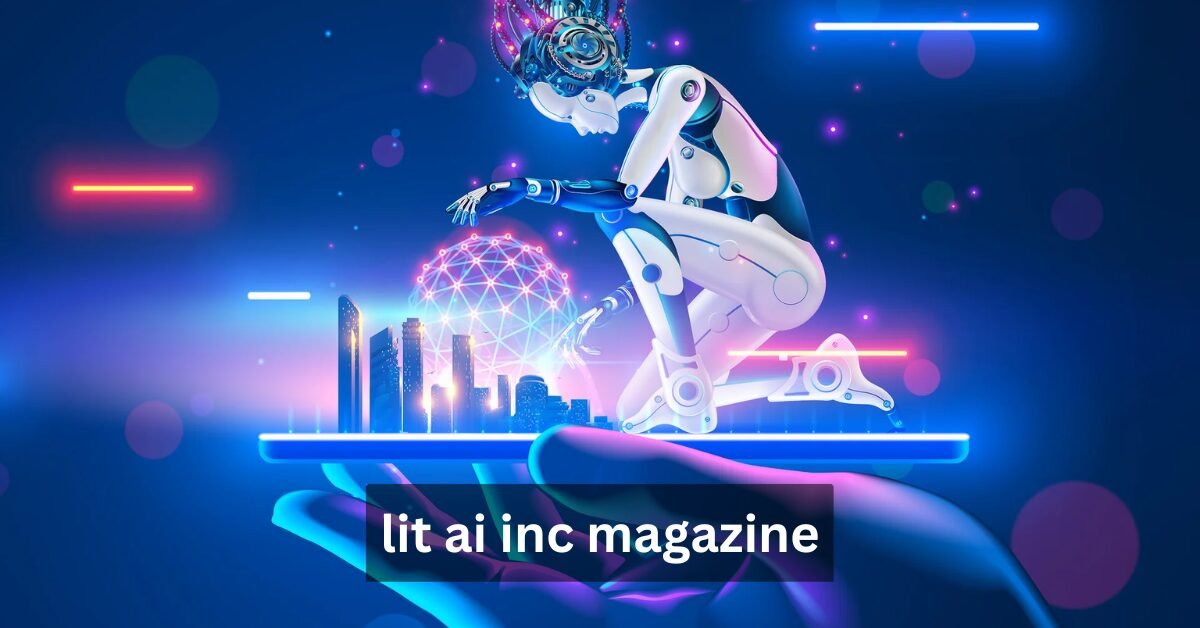Lit AI Inc Magazine stands out because of its seamless integration of artificial intelligence into digital publishing. Unlike traditional media outlets, it leverages machine learning, NLP, and AI-driven automation to produce high-quality, personalized, and timely content. It offers a unique blend of human creativity and AI-powered efficiency, ensuring that its content remains engaging, informative, and relevant to its audience.The digital era has brought rapid changes, and AI-powered content is now shaping the way we consume, create, and interact with media. Lit AI Inc Magazine is at the forefront of this revolution, redefining digital publishing with cutting-edge AI-driven solutions. From AI-powered storytelling to automated journalism, the magazine utilizes the latest AI advancements to enhance efficiency, personalization, and audience engagement. As artificial intelligence continues to evolve, it raises questions about the future of journalism, the ethics of AI-generated content, and how AI can coexist with human creativity. This article explores how Lit AI Inc Magazine is pioneering the AI-driven media space and shaping the future of digital publishing.
What is Lit AI Inc Magazine?

Brief History and Mission of the Magazine
Lit AI Inc Magazine was founded with a bold vision: to merge artificial intelligence with digital publishing and create an innovative platform that delivers high-quality, AI-generated articles with human-like accuracy and relevance. Traditional publishing has long relied on human writers, editors, and journalists to produce content. However, the integration of AI into this field has revolutionized how articles are researched, written, and distributed. Lit AI Inc Magazine aims to bridge the gap between human creativity and AI automation, ensuring a seamless blend of storytelling, information, and engagement for its readers.
How It Integrates AI into Publishing
Unlike conventional media platforms, Lit AI Inc Magazine leverages advanced GPT models, Natural Language Processing (NLP), and machine learning to curate and generate content that is both relevant and compelling. AI-driven algorithms analyze trends, audience behavior, and content preferences to create personalized experiences for readers. The magazine’s AI-based digital publishing model automates various aspects of the editorial process, including article structuring, keyword optimization, and data-driven storytelling. This results in high-quality, AI-powered content that meets the demands of today’s fast-paced digital landscape.
Key Features and Unique Selling Points
What sets Lit AI Inc Magazine apart from traditional media outlets is its ability to generate high-volume, high-quality content at scale while maintaining human-like storytelling elements. AI-powered personalization enables the magazine to deliver tailored content recommendations based on reader interests. Additionally, the platform employs AI content curation platforms to organize and distribute content efficiently, making it easier for readers to access relevant information. The magazine also embraces AI-based subscription models, where readers receive customized content based on their browsing habits and preferences, ensuring a highly engaging and personalized reading experience.
The Role of AI in Digital Publishing
How AI is Transforming Content Creation
The integration of AI in digital publishing is revolutionizing the way content is produced and consumed. AI-powered writing tools have significantly increased the speed and efficiency of content generation. Traditional publishing processes require extensive research, writing, and editing, but AI-driven platforms can now automate these tasks, reducing time and labor costs. AI-generated articles are crafted with natural language understanding, allowing them to mimic human writing styles while maintaining factual accuracy. With tools like Google Bard and OpenAI’s GPT models, AI can generate in-depth, well-researched content in minutes.
AI-Powered Writing Tools and Automation
Automated journalism is reshaping the industry, allowing media companies to publish thousands of AI-generated articles daily. AI-driven platforms analyze real-time data, news trends, and social media insights to produce accurate, timely, and engaging content. AI also assists in writing SEO-optimized articles by identifying high-ranking keywords, structuring content for better readability, and optimizing metadata. Additionally, AI-powered storytelling enhances audience engagement by analyzing reader behavior and generating personalized narratives based on their preferences.
The Impact of AI on Journalism and Editorial Work
AI’s role in journalism is both exciting and controversial. While AI-driven media can produce content faster and more efficiently than human writers, concerns about AI ethics in journalism have emerged. The debate around AI bias, misinformation, and the loss of human creativity is ongoing. However, Lit AI Inc Magazine ensures that AI-generated content undergoes strict fact-checking, editorial review, and ethical compliance to maintain accuracy and credibility. AI is not here to replace human journalists but rather to assist them by automating repetitive tasks, allowing them to focus on investigative journalism, opinion pieces, and creative storytelling.
Key Technologies Powering Lit AI Inc Magazine
Natural Language Processing (NLP)
NLP plays a crucial role in AI-based digital publishing, allowing AI algorithms to understand, interpret, and generate human-like text. Through NLP, AI can analyze vast amounts of data, identify trends, and generate insightful content that is both relevant and engaging.
Machine Learning and AI Algorithms
Machine learning enables Lit AI Inc Magazine to continuously improve its content generation process. AI models are trained on vast datasets, learning from reader interactions to optimize content personalization and engagement.
Personalized Content Recommendation Engines
AI-powered recommendation engines track user behavior, interests, and reading patterns to suggest articles that align with individual preferences. This not only enhances user experience but also boosts reader retention and engagement.
AI-Driven Content Curation and Tagging
AI content curation platforms categorize articles based on topics, keywords, and user preferences, making it easier for readers to find relevant content. AI-driven automation significantly reduces the time spent on manual content organization and distribution.
Benefits of AI-Powered Publishing
Enhanced Content Personalization
With AI-driven marketing in publishing, readers enjoy a tailored content experience based on their interests, search history, and reading habits. AI ensures that each user is presented with articles that are most relevant to them.
Increased Efficiency and Automation
AI dramatically reduces the time required for content creation, editing, and publishing, allowing media companies to scale their operations effortlessly.
AI’s Role in Fact-Checking and Reducing Misinformation
AI-powered publishing enhances journalistic integrity by identifying and correcting factual inaccuracies, ensuring that readers receive credible, fact-based information.
Cost-Effective Publishing Solutions
By automating content creation, AI reduces the need for large editorial teams, lowering operational costs while maintaining high-quality output.
Challenges and Ethical Considerations

AI Bias in Journalism and Content Creation
AI models can sometimes exhibit biases based on the datasets they are trained on, leading to potential misinformation. Lit AI Inc Magazine employs strict AI ethics guidelines to mitigate bias and ensure balanced reporting.
Data Privacy and Security Concerns
As AI collects and processes user data for content personalization, privacy concerns arise. The magazine prioritizes data protection, transparency, and compliance with privacy regulations to build trust with its audience.
The Balance Between AI and Human Creativity
AI may be powerful, but human creativity remains irreplaceable. Lit AI Inc Magazine embraces a hybrid approach, combining AI efficiency with human insight to produce engaging, thought-provoking content.
Final Thoughts: The Future of AI in Publishing
The rapid advancements in AI-powered publishing, digital media automation, and machine learning-driven content strategies are shaping the future of journalism and digital media. As artificial intelligence continues to evolve, media companies must embrace AI ethically and responsibly to maintain credibility and trust. Lit AI Inc Magazine serves as a pioneering force in this transformation, demonstrating how AI can be leveraged to create high-quality, engaging, and personalized content while maintaining journalistic integrity.
Conclusion
The future of AI in publishing will likely see even more innovations in AI-powered storytelling, automated journalism, and real-time audience engagement. The ability to combine AI-driven efficiency with human creativity will be the key to success in the digital media landscape. As we move forward, media companies, journalists, and content creators must find a balance between AI automation and human oversight to ensure that AI remains a tool for empowerment rather than a replacement for authentic journalism.
Frequently Asked Questions
Can AI-Generated Content Match the Quality of Human Writing?|
Yes, AI-generated content has evolved significantly with the advancement of GPT models and NLP algorithms. AI can now produce well-structured, fact-based, and engaging articles with minimal human intervention. However, Lit AI Inc Magazine ensures that human editors review AI-generated content to enhance creativity, accuracy, and emotional depth, making the final output indistinguishable from human-written content.
Is AI a Threat to Traditional Journalism?
AI is not a replacement for traditional journalism but a powerful tool to enhance it. While AI can automate repetitive tasks like data analysis, content curation, and SEO optimization, human journalists are still essential for investigative reporting, storytelling, and critical analysis. Lit AI Inc Magazine uses AI to support journalists rather than replace them, allowing them to focus on more in-depth and creative aspects of journalism.
How Does AI Improve Audience Engagement in Digital Publishing?
AI enhances audience engagement by using personalized content recommendation engines to match articles with readers’ preferences. It analyzes user behavior, search history, and reading patterns to deliver content that is most relevant to each individual. Additionally, AI-powered marketing strategies help media companies target the right audience with highly tailored and engaging content, increasing reader retention and interaction.
What Are the Ethical Concerns Surrounding AI in Publishing?
Some ethical concerns related to AI-powered publishing include AI bias, misinformation, and data privacy. Since AI models learn from existing datasets, they can sometimes perpetuate biases if not properly regulated. Lit AI Inc Magazine actively combats these concerns by implementing strict ethical guidelines, transparent AI policies, and thorough fact-checking mechanisms to ensure its content remains accurate, unbiased, and trustworthy.
How Does AI Help with SEO Optimization?
AI significantly improves SEO optimization by analyzing search engine algorithms, identifying high-ranking keywords, and optimizing metadata for better search visibility. AI-powered platforms can also automatically structure content in a way that enhances readability, improves user experience, and increases organic traffic. Lit AI Inc Magazine uses AI to maximize content reach and engagement while maintaining high editorial standards.
What is the Future of AI-Powered Journalism?
The future of AI-powered journalism looks promising, with continuous advancements in AI-driven storytelling, automated fact-checking, and real-time content generation. As AI becomes more sophisticated, media companies like Lit AI Inc Magazine will play a crucial role in shaping a new era of digital publishing that prioritizes accuracy, personalization, and audience-driven content strategies. AI will continue to enhance journalism by enabling faster reporting, deeper insights, and greater accessibility to information.
How Does AI Ensure Content Quality in Digital Publishing?
AI ensures content quality by utilizing data-driven insights, grammar-checking tools, plagiarism detection, and real-time fact verification. With tools like OpenAI’s GPT models and Google Bard, AI-generated articles maintain high readability and relevance. Lit AI Inc Magazine combines AI automation with human editorial oversight to ensure that every piece meets professional publishing standards before it is published.
Will AI Change How We Consume News and Media?
Yes, AI is already changing how people consume news and media by providing hyper-personalized content experiences. AI-powered recommendation systems analyze user preferences and deliver curated news feeds tailored to individual interests. Additionally, AI automation in voice assistants, chatbots, and smart news platforms enables users to access real-time news updates efficiently. Lit AI Inc Magazine embraces these advancements to enhance its digital media offerings and keep readers informed in innovative ways.
How Can Businesses Benefit from AI-Driven Digital Publishing?
Businesses can leverage AI-driven digital publishing to improve content marketing, audience engagement, and SEO performance. AI-powered content creation tools help businesses produce high-quality articles, blogs, and reports at scale while maintaining consistency. Additionally, AI-driven data analytics and consumer insights allow businesses to refine their marketing strategies, drive organic traffic, and increase conversions. Lit AI Inc Magazine provides a valuable example of how AI can revolutionize content-driven businesses and enhance brand visibility.
Stay in touch to get more updates & alerts on Creative Released! Thank you



